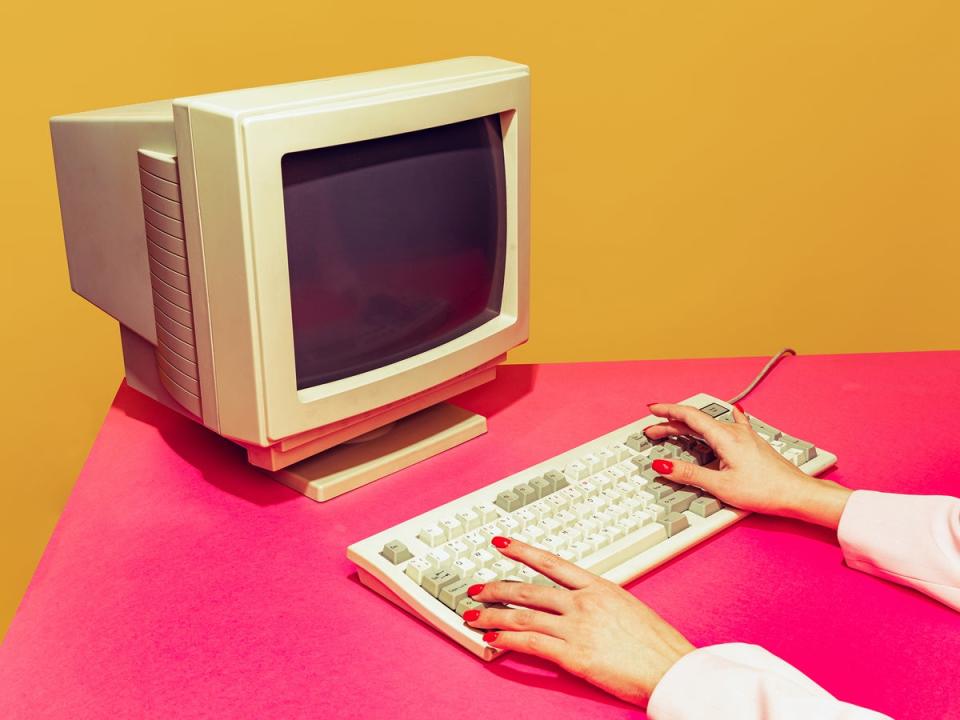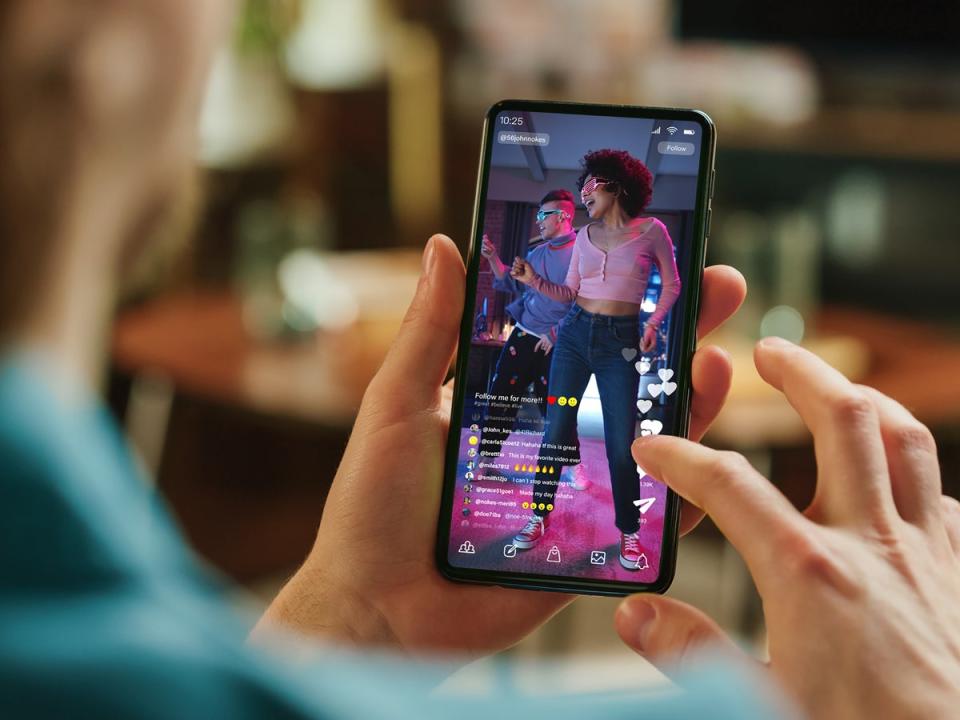Confused, uncool, and nowhere to scroll: The internet has become hostile for millennials like me

While scrolling through a lengthy photo dump of a friend’s recent paddleboarding excursion in Cornwall, I was hit by a wave of existentialism. The toxic dopamine spikes from social media that once jolted my soul were now gone. In its place was a heavy shame. “This place used to be sexy and fun,” I thought, while opening, closing, then reopening the Instagram app. “How pathetic it is to be a millennial social media addict.”
Given the definition of a “millennial” encompasses both a 28-year-old Gigi Hadid and a 42-year-old Pitbull, it would be reckless of me to generalise the status of an entire generation. Yet due to fastidious research (scrolling until my eyes bleed) and my age group’s alleged predisposition to make literally every passing thought into a narcissistic melodramatic state of the nation essay, I can officially declare that millennials are done. Jettisoned. We have no place online in 2023.
I felt the first pangs of this digital shift during the pandemic, when I gave in and synced my soul to TikTok. I had abstained for a while, believing that it might just be a blip, some temporary platform for dancing tweens and sexual predators. While I wasn’t entirely wrong, it turns out the Chinese app had longevity, and an algorithm far more sophisticated than I’d encountered before. In a matter of hours it knew what I wanted and what I didn’t want – from niche musical preferences to dietary requirements and advice for incredibly specific physical and emotional ailments. I was amazed by it as a thriving ecosystem – one led and curated by the generation succeeding my own.
Yet while my fringe interests were catered for, I quickly realised that this app was too hostile for someone of my demographic. Millennials were mocked by its younger users for using the laughing emoji or doing a crash zoom, for liking Harry Potter or depending on caffeine. Even the experience of being on the app felt out of my comfort zone – like walking into Vegas on a stag do, no sense of time passing, of how to get out, the lights dazzling bright or flashing sinister, the drugs too hardcore for a Tuesday night.
Millennials didn’t invent the internet. That was boomer Tim Berners-Lee. But millennials did create and curate much of Web 2.0 and the platforms that dominated the past 20 years: Facebook, Instagram, Snapchat, Tinder and Bumble. While I rarely post, I have been a loyal lurker, quietly evolving as the internet does, too: from the early romantic escapades forged on MSN and music forums, to lusting after the hairstyles of hipsters on MySpace, to fanatically following x-rated bloggers on Tumblr, and beyond.
There has been so much creative, subversive content made by Millennials over the past two decades, however we are largely remembered for spearheading much maligned modes of communicating: such as punctuating tweets with “This.”, “That’s it. That’s the tweet.”, or “Thanks for coming to my Ted Talk”. We’re even aesthetically affiliated with a kind of air headed numbness – our loyalty to the Pepto Bismol “millennial pink”, or the “duck lip” pout, for example. Because our voice and style was so dominant for such a stretch of digital history, it has been hard for us to subtly assimilate into a new domain.
Social media no longer holds that voyeuristic thrill that initially lured me in – the one that made me feel excited, intrigued, as if I could view another’s life in an unfiltered, uncurated way
This quandary is not, however, simply a matter of ageing out of the internet: social media is not some house party you are shunned from the moment you start considering orthopaedic shoes or linger too long in front of boxes of Tena Lady. Instead, it is a very specific millennial conundrum. TikTok continues to be the fastest growing platform, pioneered by Gen Z’s absurdist humour and irony. Facebook has become a safe haven for Boomers and Gen X – with its users 19 per cent more likely to share content than any other generation. They are active: engaged, creating communities and conversations. The once college-centric networking website remains the UK’s largest social media platform, driven, on my feed at least, by 58-year-olds airing their political grievances, nostalgic photos, and hot takes on the new Orbital album. I used to visit Facebook with a kind of arrogance, assuming everyone on there was a luddite who was missing out on the fun. Now I visit Facebook and feel a twinge of jealousy – that there are so many socially active friends, welcoming kind users who post enthusiastically, often about Orbital.
Twitter, meanwhile, once our networking event, our speed dating space, our standup special, is now our apocalyptic wasteland. I still see us roaming around, as if one funny one-liner might get us that validation we need to ascend our professional quagmire or help us meet the love of our lives, but it is futile. Since Elon Musk’s tenure, I enter and am immediately confused by its algorithm; unsure of why I can only see Tweets from people I’ve never heard of, posting about harrowing subjects I’ve never before engaged with. It is the antithesis of TikTok; so lacking in intuition that I feel like tapping its hand and suggesting we just “leave it” and watch Netflix instead.
So where are millennials destined to go? Instagram can have supportive communities (particularly when it comes to parenting), but generally speaking the platform feels like a strange, artificial universe. There’s a tragic sensation that everyone is still playing along with a game that ended a long time ago – the one in which we all pretended our lives were relentlessly fabulous and our skin was naturally that smooth. All the old hot girls I used to obsess over have had babies or become doulas or business women and their brands are too curated to reveal any grit or dirt. Sometimes they’ll do a post about their cellulite and tell you “not to believe everything that you see on the internet”, but a few hours later it’s back to the bikini shots and handstands at sunset. Zoomers see through it. Boomers couldn’t care less. It’s just us, millennials – staring at far-away pics of bike rides or some kind of new domesticated tedium involving homemade crisps or the aforementioned paddleboarding, and yearning for the adrenaline spike of logging on in 2006.

Is it Substack? Do I launch a Substack about my shed renovation? Or different ways to make tofu fun? Hopelessly Devoted Tofu? I didn’t have enough hot takes for Twitter, let alone a weekly 800 words for six subscribers, four of whom will never open the email. Reddit is a viable option – in fact millennials are its largest users in the UK, however the interface makes me anxious and I go online to stare at people I vaguely know rather than wanting Deadpool spoilers and cat memes.
As I gambol across the internet, unable to satiate my need for a spike of that noxious digital buzz, I realise that maybe I am not the problem. The social media that I grew up with is not what it used to be. It no longer holds that voyeuristic thrill that initially lured me in – the one that made me feel excited, intrigued, as if I could view another’s life in an unfiltered, uncurated way. I don’t want content creators showing me their Arket hauls. I want uploads of 58 photos from a house party that reveal the unflattering side-profile of a popular person I’ve always been jealous of. The internet was once an illicit porthole into someone else’s life, rather than a proud declaration of their existence that might stoke enough engagement to get a sponsorship deal.
On top of the facile millennial ridicule and the lack of community, it is clear I’m no longer compatible with the way these platforms and its users now operate. If that is the case, perhaps it’s time for me, and the rest of my anxious, internet-addled generation, to do the most credible thing we’ve ever done: log out for good.
At least until we’re ready to upgrade to Facebook. Or Tena Lady.
‘Is This OK?: One Woman’s Search for Connection Online’ by Harriet Gibsone is in shops now

 Yahoo Sports
Yahoo Sports 